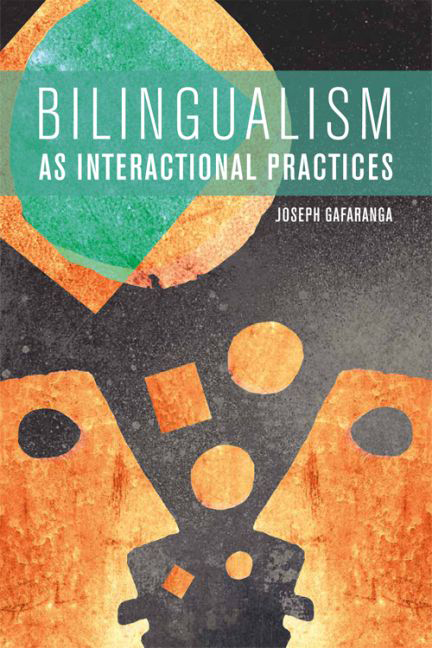Book contents
- Frontmatter
- Contents
- List of illustrations
- Acknowledgements
- Transcription conventions
- 1 Introduction
- 2 The rehabilitation of code-switching
- 3 An inductive perspective on bilingualism as interactional practices
- 4 Language choice and speech representation in bilingual interaction
- 5 Language choice and conversational repair in bilingual interaction
- 6 Language choice and appositive structures in written texts in Rwanda
- 7 Summary and conclusion
- References
- Index
6 - Language choice and appositive structures in written texts in Rwanda
Published online by Cambridge University Press: 26 April 2017
- Frontmatter
- Contents
- List of illustrations
- Acknowledgements
- Transcription conventions
- 1 Introduction
- 2 The rehabilitation of code-switching
- 3 An inductive perspective on bilingualism as interactional practices
- 4 Language choice and speech representation in bilingual interaction
- 5 Language choice and conversational repair in bilingual interaction
- 6 Language choice and appositive structures in written texts in Rwanda
- 7 Summary and conclusion
- References
- Index
Summary
Introduction
The third interactional practice I want to use by way of illustrating how the study of bilingualism, and of language alternation in particular, can be taken forward and continue to be relevant and interesting, now that its initial purpose of rehabilitating bilingualism has largely been achieved, can be termed translinguistic apposition. A common definition of apposition (see, for example, Quirk et al., 1985: 1300–20) is as a syntactic structure whereby two noun phrases with a similar meaning are placed next to each other, the second functioning as an explanation, clarification, renaming and so on of the first. In turn, two types of appositive can be found, namely restrictive and non-restrictive appositives. A restrictive appositive significantly narrows the scope of the noun it is appositioned to, while a non-restrictive appositive does not. As a result, a non-restrictive appositive can be deleted without any (major) effect on content, while a restrictive appositive cannot. Consequently, a non-restrictive appositive is set off from the main structure of the sentence, usually by devices such as commas, brackets, dashes and so on, while a restrictive appositive is not. So the difference between the sentence ‘Joseph Gafaranga, a Rwandan linguist, currently works at the University of Edinburgh’ and the sentence ‘The Rwandan linguist Joseph Gafaranga works at the University of Edinburgh’ can be explained in terms of the distinction restrictive versus non-restrictive apposition.
In Rwanda, especially in texts Sebba (2002, 2013) describes as ‘most highly regulated’ (MHR), non-restrictive appositives can be realised bilingually; hence the term translinguistic apposition. Here are some examples:
Extract 6.1 (Imyanzuro_y_Umwiherero_w_abayobozi_abakuru_b_ igihugu.pdf.274kB-primature. gov.rw; accessed 12 June 2014)
Gushyiraho politike n'amategeko yo kubaka amazu aciriritse (low cost housing) no gushyiraho uburyo bunoze bwo kubaka ayo mazu kandi akabonekera ku gihe cyateganyijwe.
To develop policies and regulations on building low cost houses (low cost housing) and appropriate modalities for building those houses such that they are available on time.
Extract 6.1 reproduces the text of one of the recommendations of the most recent Umwiherero w'Igihugu,2 as posted on the webpage of the Prime Minister's Office (at the time of writing). In the extract, a Kinyarwanda noun phrase (amazu aciriritse) is used and, as if to clarify and specify it, an English equivalent (low cost housing) is juxtaposed to it.
- Type
- Chapter
- Information
- Bilingualism as Interactional Practices , pp. 117 - 144Publisher: Edinburgh University PressPrint publication year: 2017



